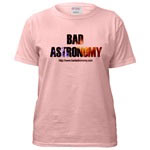
| Bad Astronomy |
|
|
|
BA Blog
|
|
Q & BA
|
|
Bulletin Board
|
| Media |
|
|
|
Bitesize Astronomy
|
|
Bad Astro Store
|
|
Mad Science
|
|
Fun Stuff
|
| Site Info |
|
|
|
Links
|
| RELATED SITES |
| - Universe Today |
| - APOD |
| - The Nine Planets |
| - Mystery Investigators |
| - Slacker Astronomy |
| - Skepticality |
Buy My Stuff

Keep Bad Astronomy close to your heart, and help make me
filthy rich. Hey, it's either this or one of those really
irritating PayPal donation buttons here.
Not Very Bright
November 1, 2000As I write this, a team of three humans is preparing to dock with the International Space Station (ISS). They are Expedition 1, the first team of people to occupy the station. If all goes as planned, the station will always have someone on board until the mission ends. This in turn means that someone will always be in space, from now on, forever.
This will not stop misinformation about the ISS though. The Bad Astronomer's work is never done! Yahoo! News had a story about it in their October 31 issue. In an otherwise fine article, they say:
"...the ISS will eventually be the brightest object in the night sky and the only artificial heavenly body visible to the naked eye.
First, it won't even come close to being the brightest object in the night sky. That position is held by the Moon, which will shine something like 20,000 times brighter than the ISS at worst. Venus is second, which is roughly 2-5 times brighter than ISS.
Second, it is not the only ``artificial heavenly body visible to the naked eye.'' I guess the writer never read my page about spotting satellites. There are dozens or even hundreds of artificial satellites visible to the unaided eye. ISS will be among the brightest of these, but the doomed Iridium satellites get brighter, and Mir, the ISS's predecessor, can get brighter as well.
These mistakes aren't a big deal, but still... most people don't believe me when I tell them they can see a satellite. A passerby was shocked last night when I showed him Saturn through my telescope; he didn't know you could see planets with your own eyes! With this kind of misconception rampant, it would be nice to see more accurate information out there.
My thanks to Bad Reader Stephen Coleman of the Richmond (Virginia) Astronomical Society for letting me know about this one.
|
|
This page last modified
|
|